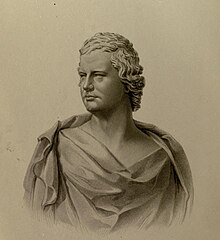William Edmonstoune Aytoun

William Edmonstoune Aytoun (born June 21, 1813 in Edinburgh , † August 4, 1865 in Elgin , Moray ) was a Scottish writer and poet .
Aytoun studied law in his hometown and settled there as a lawyer in 1840. In the meantime he devoted himself more to literary work and wrote numerous and funny articles for the ultra-liberal Tait's Magazine .
He soon turned to Toryism and became an associate, later editor, of the conservative Blackwood Magazine ; in particular he directed his pen against the railroad fraud and the materialistic tendencies of the Manchester School.
A historical work, Life and times of Richard, king of England (London 1840), did not find much applause, the greater his satirical and polemical Bon Gaultier ballads , which appeared in Punch in 1844 and were later combined in one volume.
In 1845 Ayton became Professor of Rhetoric and Fine Sciences at the University of Edinburgh , was made an honorary sheriff and admiral of the Orkney and Shetland Islands under the Derby Ministry in 1852, and died on August 4, 1865 in his Blackills country estate in the Scottish Highlands. Since 1849 he was a Fellow of the Royal Society of Edinburgh .
He represented his critical teachings poetically through Fi [?] Milian, or the student of Badajoz; a spasmodic tragedy (1854), which satirized the hyperpoetic manner of certain fashion poets in exaggerated imitation. His real fame as a poet is based on the Lays of the Scottish cavaliers , a glorification of the Stuart fighters rich in genuine poetry, which first appeared in London and Edinburgh in 1849 and has had numerous editions.
The Ballads of Scotland (4th ed. 1859, 2 vol.), A deserving, critically viewed and scholarly annotated collection of old Scottish folk songs, and his translation of Goethean poems ( Poems and ballads of Goethe , 1859 a . more often) met with general approval.
literature
- Theodore Martin : Memoir of William Edmonstone Ayton . Edinburgh, 1867.
Individual evidence
- ↑ shaper RSE Fellows 1783-2002. Royal Society of Edinburgh, accessed October 6, 2019 .
| personal data | |
|---|---|
| SURNAME | Aytoun, William Edmonstoune |
| BRIEF DESCRIPTION | Scottish lawyer and writer |
| DATE OF BIRTH | June 21, 1813 |
| PLACE OF BIRTH | Edinburgh |
| DATE OF DEATH | 4th August 1865 |
| Place of death | Elgin |